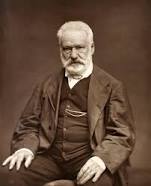Les Misérables Page #2
Les Misérables is a French historical novel by Victor Hugo, first published in 1862, that is considered one of the greatest novels of the 19th century. In the English-speaking world, the novel is usually referred to by its original French title.
The hospital was a low and narrow building of a single story, with a small garden. Three days after his arrival, the Bishop visited the hospital. The visit ended, he had the director requested to be so good as to come to his house. "Monsieur the director of the hospital," said he to him, "how many sick people have you at the present moment?" "Twenty-six, Monseigneur." "That was the number which I counted," said the Bishop. "The beds," pursued the director, "are very much crowded against each other." "That is what I observed." "The halls are nothing but rooms, and it is with difficulty that the air can be changed in them." "So it seems to me." "And then, when there is a ray of sun, the garden is very small for the convalescents." "That was what I said to myself." "In case of epidemics,--we have had the typhus fever this year; we had the sweating sickness two years ago, and a hundred patients at times,--we know not what to do." "That is the thought which occurred to me." "What would you have, Monseigneur?" said the director. "One must resign one's self." This conversation took place in the gallery dining-room on the ground-floor. The Bishop remained silent for a moment; then he turned abruptly to the director of the hospital. "Monsieur," said he, "how many beds do you think this hall alone would hold?" "Monseigneur's dining-room?" exclaimed the stupefied director. The Bishop cast a glance round the apartment, and seemed to be taking measures and calculations with his eyes. "It would hold full twenty beds," said he, as though speaking to himself. Then, raising his voice:-- "Hold, Monsieur the director of the hospital, I will tell you something. There is evidently a mistake here. There are thirty-six of you, in five or six small rooms. There are three of us here, and we have room for sixty. There is some mistake, I tell you; you have my house, and I have yours. Give me back my house; you are at home here." On the following day the thirty-six patients were installed in the Bishop's palace, and the Bishop was settled in the hospital. M. Myriel had no property, his family having been ruined by the Revolution. His sister was in receipt of a yearly income of five hundred francs, which sufficed for her personal wants at the vicarage. M. Myriel received from the State, in his quality of bishop, a salary of fifteen thousand francs. On the very day when he took up his abode in the hospital, M. Myriel settled on the disposition of this sum once for all, in the following manner. We transcribe here a note made by his own hand:-- NOTE ON THE REGULATION OF MY HOUSEHOLD EXPENSES. For the little seminary . . . . . . . . . . . . . . 1,500 livres Society of the mission . . . . . . . . . . . . . . 100 " For the Lazarists of Montdidier . . . . . . . . . . 100 " Seminary for foreign missions in Paris . . . . . . 200 " Congregation of the Holy Spirit . . . . . . . . . . 150 " Religious establishments of the Holy Land . . . . . 100 " Charitable maternity societies . . . . . . . . . . 300 " Extra, for that of Arles . . . . . . . . . . . . . 50 " Work for the amelioration of prisons . . . . . . . 400 " Work for the relief and delivery of prisoners . . . 500 " To liberate fathers of families incarcerated for debt 1,000 " Addition to the salary of the poor teachers of the diocese . . . . . . . . . . . . . . . . . . . 2,000 " Public granary of the Hautes-Alpes . . . . . . . . 100 " Congregation of the ladies of D----, of Manosque, and of Sisteron, for the gratuitous instruction of poor girls . . . . . . . . . . . . . . . . . . . . 1,500 " For the poor . . . . . . . . . . . . . . . . . . . 6,000 " My personal expenses . . . . . . . . . . . . . . . 1,000 " ------ Total . . . . . . . . . . . . . . . . . . . . 15,000 " M. Myriel made no change in this arrangement during the entire period that he occupied the see of D---- As has been seen, he called it regulating his household expenses. This arrangement was accepted with absolute submission by Mademoiselle Baptistine. This holy woman regarded Monseigneur of D---- as at one and the same time her brother and her bishop, her friend according to the flesh and her superior according to the Church. She simply loved and venerated him. When he spoke, she bowed; when he acted, she yielded her adherence. Their only servant, Madame Magloire, grumbled a little. It will be observed that Monsieur the Bishop had reserved for himself only one thousand livres, which, added to the pension of Mademoiselle Baptistine, made fifteen hundred francs a year. On these fifteen hundred francs these two old women and the old man subsisted. And when a village curate came to D----, the Bishop still found means to entertain him, thanks to the severe economy of Madame Magloire, and to the intelligent administration of Mademoiselle Baptistine. One day, after he had been in D---- about three months, the Bishop said:-- "And still I am quite cramped with it all!" "I should think so!" exclaimed Madame Magloire. "Monseigneur has not even claimed the allowance which the department owes him for the expense of his carriage in town, and for his journeys about the diocese. It was customary for bishops in former days." "Hold!" cried the Bishop, "you are quite right, Madame Magloire." And he made his demand. Some time afterwards the General Council took this demand under consideration, and voted him an annual sum of three thousand francs, under this heading: Allowance to M. the Bishop for expenses of carriage, expenses of posting, and expenses of pastoral visits. This provoked a great outcry among the local burgesses; and a senator of the Empire, a former member of the Council of the Five Hundred which favored the 18 Brumaire, and who was provided with a magnificent senatorial office in the vicinity of the town of D----, wrote to M. Bigot de Préameneu, the minister of public worship, a very angry and confidential note on the subject, from which we extract these authentic lines:--
Translation
Translate and read this book in other languages:
Select another language:
- - Select -
- 简体中文 (Chinese - Simplified)
- 繁體中文 (Chinese - Traditional)
- Español (Spanish)
- Esperanto (Esperanto)
- 日本語 (Japanese)
- Português (Portuguese)
- Deutsch (German)
- العربية (Arabic)
- Français (French)
- Русский (Russian)
- ಕನ್ನಡ (Kannada)
- 한국어 (Korean)
- עברית (Hebrew)
- Gaeilge (Irish)
- Українська (Ukrainian)
- اردو (Urdu)
- Magyar (Hungarian)
- मानक हिन्दी (Hindi)
- Indonesia (Indonesian)
- Italiano (Italian)
- தமிழ் (Tamil)
- Türkçe (Turkish)
- తెలుగు (Telugu)
- ภาษาไทย (Thai)
- Tiếng Việt (Vietnamese)
- Čeština (Czech)
- Polski (Polish)
- Bahasa Indonesia (Indonesian)
- Românește (Romanian)
- Nederlands (Dutch)
- Ελληνικά (Greek)
- Latinum (Latin)
- Svenska (Swedish)
- Dansk (Danish)
- Suomi (Finnish)
- فارسی (Persian)
- ייִדיש (Yiddish)
- հայերեն (Armenian)
- Norsk (Norwegian)
- English (English)
Citation
Use the citation below to add this book to your bibliography:
Style:MLAChicagoAPA
"Les Misérables Books." Literature.com. STANDS4 LLC, 2025. Web. 5 Feb. 2025. <https://www.literature.com/book/les_mis%C3%A9rables_13>.








Discuss this Les Misérables book with the community:
Report Comment
We're doing our best to make sure our content is useful, accurate and safe.
If by any chance you spot an inappropriate comment while navigating through our website please use this form to let us know, and we'll take care of it shortly.
Attachment
You need to be logged in to favorite.
Log In